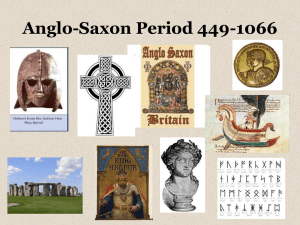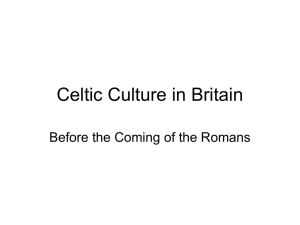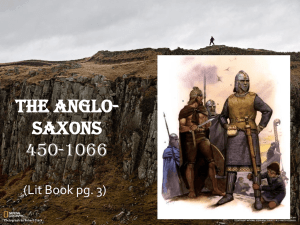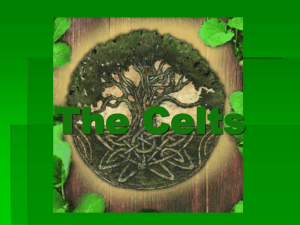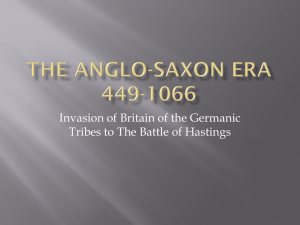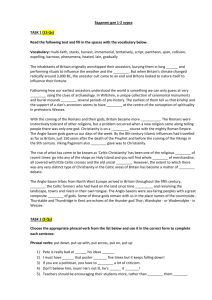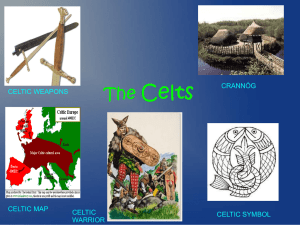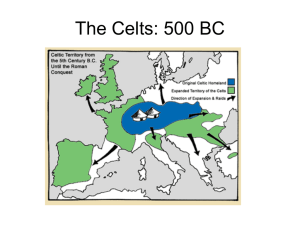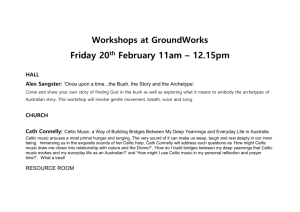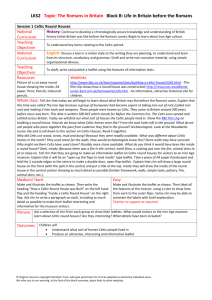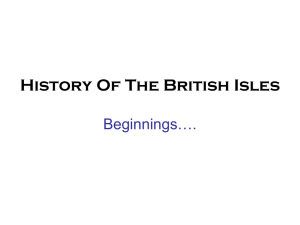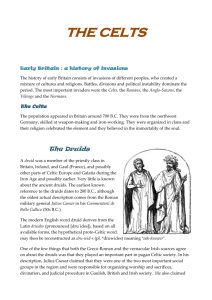Anglo Saxon notes
advertisement
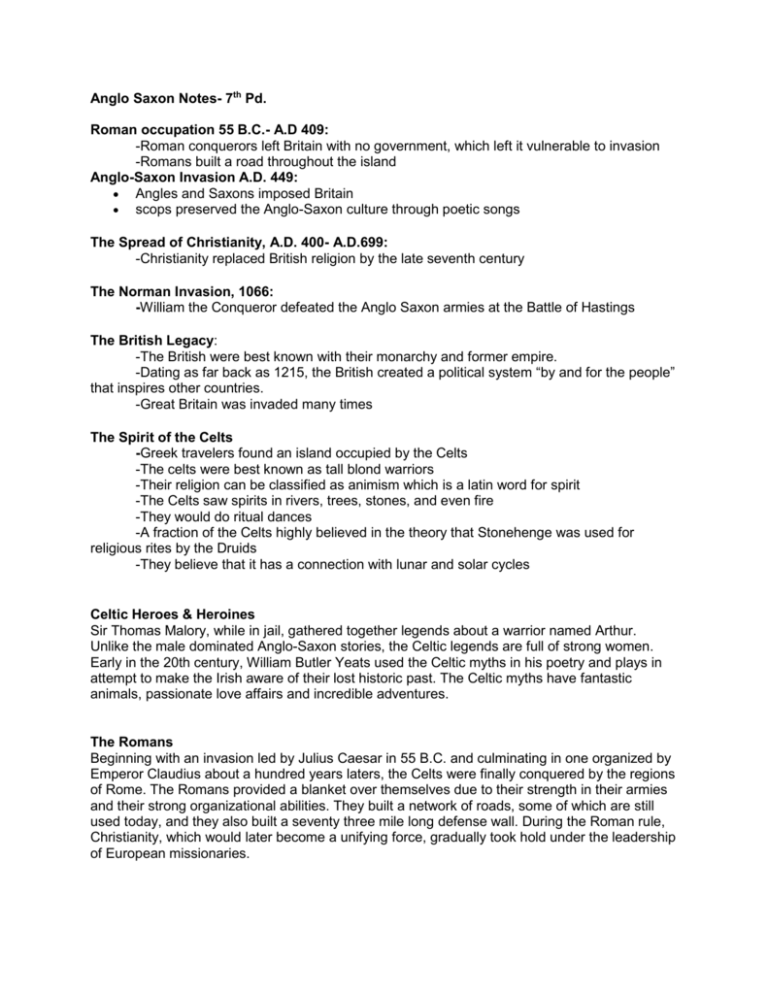
Anglo Saxon Notes- 7th Pd. Roman occupation 55 B.C.- A.D 409: -Roman conquerors left Britain with no government, which left it vulnerable to invasion -Romans built a road throughout the island Anglo-Saxon Invasion A.D. 449: Angles and Saxons imposed Britain scops preserved the Anglo-Saxon culture through poetic songs The Spread of Christianity, A.D. 400- A.D.699: -Christianity replaced British religion by the late seventh century The Norman Invasion, 1066: -William the Conqueror defeated the Anglo Saxon armies at the Battle of Hastings The British Legacy: -The British were best known with their monarchy and former empire. -Dating as far back as 1215, the British created a political system “by and for the people” that inspires other countries. -Great Britain was invaded many times The Spirit of the Celts -Greek travelers found an island occupied by the Celts -The celts were best known as tall blond warriors -Their religion can be classified as animism which is a latin word for spirit -The Celts saw spirits in rivers, trees, stones, and even fire -They would do ritual dances -A fraction of the Celts highly believed in the theory that Stonehenge was used for religious rites by the Druids -They believe that it has a connection with lunar and solar cycles Celtic Heroes & Heroines Sir Thomas Malory, while in jail, gathered together legends about a warrior named Arthur. Unlike the male dominated Anglo-Saxon stories, the Celtic legends are full of strong women. Early in the 20th century, William Butler Yeats used the Celtic myths in his poetry and plays in attempt to make the Irish aware of their lost historic past. The Celtic myths have fantastic animals, passionate love affairs and incredible adventures. The Romans Beginning with an invasion led by Julius Caesar in 55 B.C. and culminating in one organized by Emperor Claudius about a hundred years laters, the Celts were finally conquered by the regions of Rome. The Romans provided a blanket over themselves due to their strength in their armies and their strong organizational abilities. They built a network of roads, some of which are still used today, and they also built a seventy three mile long defense wall. During the Roman rule, Christianity, which would later become a unifying force, gradually took hold under the leadership of European missionaries. Anglo-Saxons Sweep Ashore In the fifth century the Angles and Saxons, from Germany, and the Jutes, from Denmark, drove the old Britons to the perimeter of their country and imposed their language and warrior culture on most of britain.they brought with them a fierce loyalty to their tight-knit communities and to their grim religion. The Celts put up a strong resistance to this before they retreated into Wales, which was the far west of the country. Unifying Forces: Alfred the Great and Christianity -country divided into several independent principalities -King alfred of Wessex invaded the Danes -Danes: one of the fierce viking people who crossed the cold North Sea in dragon-prowed boats in the 8th and 9th centuries -Christianity reemerged in Britain. -Christianity provided a common faith and common system of morality and right conduct and linked England to Europe -Anglo Saxons fought to protect their people, culture, and church from the Danes -Danes were defeated in 1066 by William duke of Normandy and his Invading force of Normans Anglo-Saxon Life 1939 archeologists discovered a treasure that had been under for 1300 years Ship grave contained imprints of a huge wooden ship and vast treasure trove no trace of king or warrior, but there were other treasures Were not barbarians,but they were frequently shown that way did not lead luxurious life not dominated by the arts law and order was responsibility of the leader Beowulf makes his name by defeating the monsters taht try to destroy king hrothgar The Anglo-Saxton Religion: Gods for Warriors Despite Christianity influencing, the old Anglo-Saxton religion, with its warrior, gods, persisted. Odin was the god of death, poetry, and magic. The Anglo-Saxton name for Odin was Woden. Woden helped people communicate with spirits, and other death things. This was important for poetry and religious mysteries. Woden is wednesday. The Anglo-Saxton deity named thunor who was worships just like the god Thor for thunder and lightining. His sign was a hammer. Thunor is thursday. Dragon is the protector of treasure. Focuses on bravery, loyalty, generosity, and friendship. The Bards: Singing of Gods and Heroes The Anglo-Saxton communal hall was a place that offered shelter and also a place for storytelling. Homeric Greece more than one thousand years earlier in this ancient world with skilled story tellers or Bards. Anglo-Saxton called these Bards Scops. The poets sang to the playing of a harp. Hope in Immortal Verse Celtic Heroes & Heroines Sir Thomas Malory, while in jail, gathered together legends about a warrior named Arthur. Unlike the male dominated Anglo-Saxon stories, the Celtic legends are full of strong women. Early in the 20th century, William Butler Yeats used the Celtic myths in his poetry and plays in attempt to make the Irish aware of their lost historic past. The Celtic myths have fantastic animals, passionate love affairs and incredible adventures. A Light from Ireland Was not overrun by the Germanic invaders Isolated and surrounded by wild seas 432 the whole of Celtic Ireland was converted to christianity by romanized Briton named Patricius -When he was a teenager he was seized by Irish Slave Traders - held in bondage by a sheepherder in Ireland for 6 years - escaped captivity - became a bishop - returned to covert his former captors 432-750 Ireland experienced a Golden Age Irish Monks founded monasteries that became sanctuaries of learning for refugee scholars from Europe and England Christianity “burned and gleamed through the darkness” -Winston Churchill The Christian Monasteries: The Ink Froze Poets provided one element of hope: The possibility that heroic deeds might be enshrined in society’s memory, along with Christianity. Monasteries preserved not only the Latin and Greek classics, but also some of the great works of popular literature such as Beowulf. Monks assigned to the monastery's scriptorium probably spent almost all their daylight hours copying manuscripts by hand. The Church took learning so seriously that many scribes would write in freezing conditions during the winter, which would cause the ink to freeze. The Rise of the English Language Latin was the language of serious study King Alfred instituted the Anglo-Saxon Chronicles It explained history King Alfred made England respect English as a language of culture Old English stories and poems became great works of literature preserved by monks WOMEN IN ANGLO SAXON PERIOD Women had rights, which were stopped after the Norman Conquest in 1066. Women inherited property, and retained control over that property even after they got married Potential husbands were required to offer a woman a gift of money and land in order for her to consider their proposal Women also joined religious communities and would become important figures within the society.
